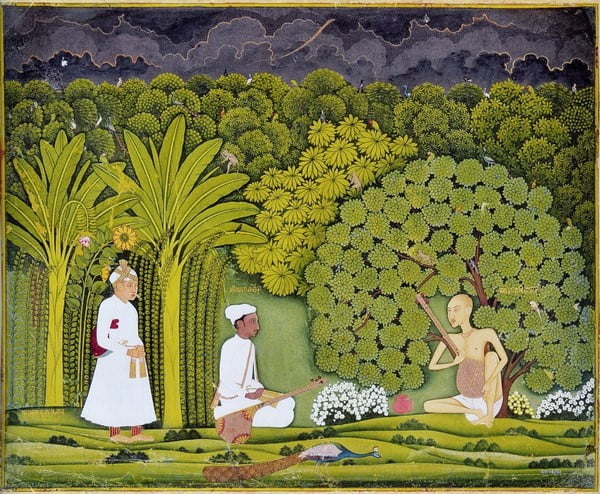Powerful people cannot tolerate somebody who has no power and yet is respected by millions of people. They understand only the language of power, they don’t understand the language of love, they don’t understand the language of creativity. They don’t understand that a song is more powerful than any nuclear weapon, that a poet is more powerful than any president, because the poet creates.
The poet does not claim domination over anybody; he simply shares his heart, his melody, his songs. He is really an emperor. He may be nobody as far as the power elites are concerned, but he reaches to the very heart of humanity. The presidents will be forgotten, the prime ministers will be forgotten, but the song of a poet, the music of a musician, will go on echoing down the corridors of time. It belongs to eternity.
I am reminded about one of the emperors of India, Akbar.
In his life – Akbar Namah is his autobiography – he was very interested in all kinds of creative people. In his court he had the greatest poets of the country, the wisest people of the country, the great singers, the great musicians, the great dancers. His court must have been one of the richest courts that any emperor ever had.
His court musician was Tansen, and it was thought that Tansen had never been surpassed. His music was magic, had a hypnotic power, and Akbar could not be satisfied even listening to him every day. Even today, in Gwalior, there is his samadhi and singers from all over the country go there on his birthday to pay their respects to that great genius.
Late in the night, one day when he was leaving the palace, Akbar said to Tansen, “Tansen, I have never told you, but the idea has arisen in me many times… I cannot conceive anybody to be a better musician than you; it is just inconceivable. But forgive me… the idea arises in me, that if your teacher is alive, I would like to see him who has taught you music, with whom you went through this discipline. Who knows, your teacher may be a greater musician – although I cannot conceive in what way he can be greater than you.”
Tansen said, “My teacher is alive, and you may not be able to conceive of it, but I am just dust under his feet. You don’t know what totality in music is. I cannot even think of comparing myself with him. The distance is so great.”
Akbar became very excited, he said, “Call him to the court, we will welcome him, we will reward him, there will be a celebration!”
Tansen said, “That is a difficult thing because he is a sannyasin, and he lives just very close to the palace by the side of the Yamuna River in a small hut. His name is Swami Haridas, and he never sings, never plays, unless it happens spontaneously, not on demand. So, it is very difficult.
“If you really are interested, then we will have to sit by the side of his hut early in the morning, three o’clock, because that is the time when he wakes up, takes a bath in the river; and then – he has a small statue of the goddess of wisdom “Saraswati” – before the statue he plays. There is no other audience at that time. And you will have to hide behind the hut, in the trees, because if he becomes aware that somebody is listening he may not sing, he may not play on his instruments. He is a crazy man!
But who has ever heard that great creators can be other than crazy? They have a certain madness, they are not sane people in the eyes of the world.
Akbar was so excited that he said, “Tonight we will go. You don’t go home. Sleep here, and at three o’clock we will be by the side of the hut.”
An emperor, a great emperor – he ruled over the whole of India – went to listen to music as a thief! And when he heard it, Tansen could not believe it, tears were flowing from Akbar’s eyes, just of joy and ecstasy.
When they returned Akbar said to Tansen, “If your music is magic, Swami Haridas’ music is a miracle. But why is there so much difference? Up to now I used to think it is inconceivable that anybody can be a greater musician than you. Now I am thinking you stand nowhere. That poor sannyasin, your master, has something that is very elusive – but it stopped my thinking. I forgot all about time. I forgot that I am a great emperor. Those few moments have been the greatest moments in my life. What is the reason that you cannot reach to those heights?”
The answer has to be remembered.
Tansen said, “It is very simple. I sing, I play on instruments, to get something from you. I am a beggar. There is greed in me. Music I am selling; I sing because I want to GET something. He is singing because he has GOT something. He is an emperor. His song is coming out of his fullness of heart, not out of hungry greed. His music is born out of his abundant love; for no other reason, for sheer joy, just the way fragrance comes from flowers. It is not for sale, that is what makes the difference.
I am a great technician. I have learned his whole technique, there is no flaw in my technique. But my heart is empty. I have not known that ecstasy, I have not experienced that being, I have not been touched by the divine. I am a court poet, a court singer, a court musician: I do my best, but deep down there is a desire for reward. And you have been rewarding me, you have filled my house with gold. You have raised my position to being the world’s greatest musician, but I know the greatest musician is a beggar who was my master.
He is absolutely mad. He is drunk with the divine, and the music is not through any effort, but something spontaneously coming out of him. That’s why we cannot demand it.”
”I had to sit by his side for thirty years, because there was no other way. He would not teach you anything – if you could learn that was your business. He would play only when it came to him. You could watch, you could see the tremendous splendor that suddenly happened. Haridas disappeared, only the music remained. In those moments, when Swami Haridas disappeared, he was a buddha whether he knew it or not.”
I want everybody to know that if you can do something without any desire of reward or attainment, you are in meditation. You will blossom into enlightenment. Out of your abundance will come love and compassion, and for a few days you may walk differently from others. But soon you will realize that others cannot recognize it – that is one thing.
And a second thing: it is ugly on your part, mean, to show your enlightenment, to show your light to the people who are blind. It is not compassionate. Soon the enlightened man forgets about his enlightenment. That is The Great Matter – forgetting even enlightenment. The whole world is gone and enlightenment too. Nothing remains behind, you have become part of the universe.
This is rest. This is relaxation.
Enlightenment has many doors. It is not open only to the so-called saints. An artist deep in his art, painting so totally that he disappears and only the painting remains– whether he knows it or not, for that moment he has become a buddha. A singer with his totality disappears in his song.
Enlightenment is not the monopoly of the saints: that is one of the basic points I want to make clear to the world. There are a thousand and one doors. Only one single quality should be there – that you are rejoicing in doing it, for no attainment. When a singer sings, if he is singing for some reward, he cannot be total.
TO PRACTICE VIRTUE IN HOPES OF REWARD IS THE ILLUSION OF ORDINARY FOLK; BODHISATTVAS DO NOT SEEK FOR THE RESULTING REWARDS AS THEY CULTIVATE ROOTS OF VIRTUE, BECAUSE THEY CULTIVATE GOODNESS FOR THE SAKE OF IMPARTIAL LOVE AND COMPASSION, AND THUS IT BECOMES SUSTENANCE FOR ENLIGHTENMENT.
Osho, Zarathustra, A God That Can Dance – Talks on Friedrich Nietzsche’s ‘Thus spoke Zarathustra’, Ch 10 (excerpts)
Osho: Osho: Turning in: CHAPTER 4. ENLIGHTENMENT IS THE WAY TO EXTINCTION (excerpts)
जीवन का संगीत अचानक अंतिम सुर को छू लेता है
हँसता ही रहता है फिर भी मेरे अंदर मरने वाला ………………ज़फर इमाम
jiivan kaa sa.ngiit achaanak antim sur ko chhuu letaa hai
ha.nstaa hii rahtaa hai phir bhii mere andar marne vaalaa ………………ZAFAR IMAM
The music of life suddenly touches the final note,
And the soul continues to enjoy it within my dying self.
Remembering the great Indian Classical music singer Ustad Rashid Khan and his soulful music. This timeless composition resonates with emotion and captures the essence of longing and remembrance. Ustad Rashid Khan’s rendition steeped in the enchanting Raag Bageshree, infuses it with his distinctive style, evoking a sense of nostalgia and yearning. Please enjoy this jugalbandi with another gem of Indian Classical music Hariharan ji….a Thumri – ‘Yaad piya ki aaye.’
Yaad Piya Ki Aaye | Jugalbandi | Ustad Rashid Khan | Hariharan (youtube.com)


Rajiv, I have tears in my eyes reading this post from you. The deep essence of what enlightenment means and how we the ordinary can find it too is so moving. Hope that, even if for just a moment, I can find that light..
Very deep, insightful and heartening write up ❤️ thanks for sharing!
Rajiv, your post beautifully captures the essence of true creativity and its profound impact on our lives. The analogy of the poet’s song being more powerful than any weapon resonates deeply. It is fascinating to delve into the story of Tansen and Swami Haridas, illustrating the difference between creating from a place of abundance versus creating from a place of desire.
Fantastic as usual. What a great choice of music to end the wonderful write up.
One read isn’t satisfactory. It’s so divine that I feel like being in it and doesn’t want to stop reading it 🙏
Excellent read …many a times. Great tribute to music lovers.
https://www.facebook.com/share/r/A7ApYCnnvEEqimV4/?mibextid=WC7FNe